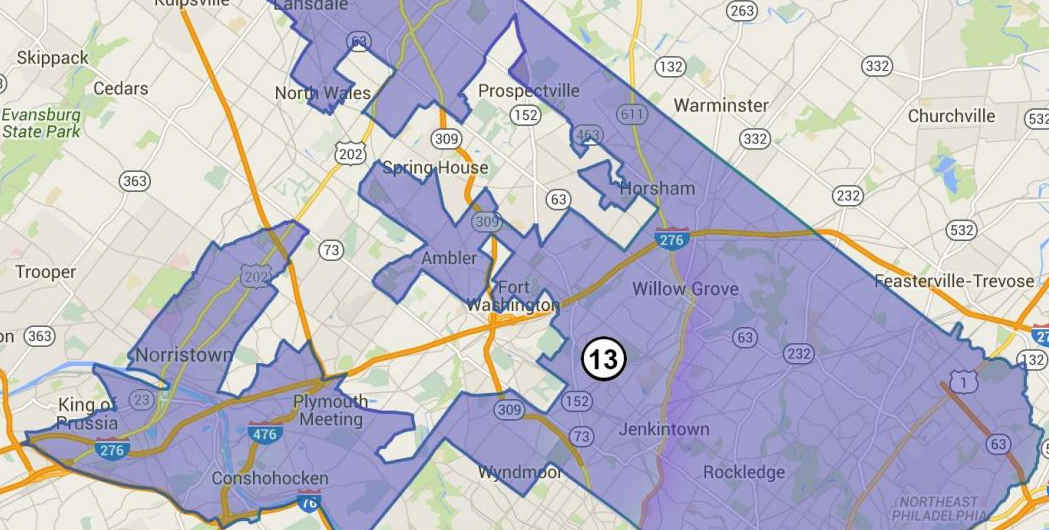When Rat F**ked: The True Story Behind The Secret Plan to Steal America’s Democracy was published in 2015, author David Daley did not expect that, two years later, he’d be on Comedy Central and the audience would burst into a near standing ovation at the mere mention of his crusade to end gerrymandering. But that’s where we’re at culturally; the gerrymander has become the new Beatlemania.

The eradication of gerrymandering is having a moment, one that wouldn’t have happened without Daley, whose critically-acclaimed book lays out in excruciating detail how a small group of political operatives cynically subverted the will of the people following the 2008 election. The book, which makes the case that Pennsylvania is ground zero for gerrymandering, is arguably one of the most important stories of the last decade; Daley, the former editor-in-chief of salon.com, seems to spend as much time now talking about the scourge of gerrymandering as when his book came out, as though he were on some type of never-ending book tour, every author’s nightmare.
Following the Pennsylvania Supreme Court’s ruling that our redistricted map violates the state constitution, I caught up with Daley to talk all things gerrymander.
LP: So how’d we get here? A whole movement has risen up since your book came out. What happened?
About GerrymanderingRead More
LP: Let’s talk about your provocative title. What does “Rat F**ked” mean?
DD: I had originally sold the book as “Gerrymander Nation,” and the publisher said, ‘You’re writing a book about the most boring topic in the world, you can’t have the most boring title in the world.’ Rat F**king is not a gratuitous vulgarity, it’s a term that’s grounded in redistricting politics. It refers to the art of political sabotage, and it goes back to Nixon’s dirty tricks team in the ‘70s, with guys like Donald Segretti. Then, in the early ‘90s, when Lee Atwater chaired the Republican National Committee, he asked a young lawyer, Ben Ginsberg, to use the provisions of the Voting Rights Act governing majority-minority districts to create African-American seats in southern states. So Ginsberg worked closely with minority groups to encourage minority candidates to run, while packing as many Democratic voters within those lines—resegregating congressional representation while increasing the number of African Americans in Congress. It benefited black leaders and Republicans at the expense of the Democratic party. Ginsberg called it Project Rat F**k.
That’s where we’re at culturally; the gerrymander has become the new Beatlemania.
LP: That’s amazingly cynical.
DD: It’s masterful politics, right? And then you fast forward to 2010 and we get REDMAP—short for Redistricting Majority Party.
LP: You actually found the guy—a political operative named Chris Jankowski—who dreamed it up.
Watch David Daley on The OppositionVideo
DD: After the 2008 election, he was drinking a cup of coffee and reading The New York Times when he realized: Republicans should mount a campaign to flip state legislatures ahead of post-Census redistricting. You control the state legislatures, you control redistricting. You control redistricting, you can control Congress. Karl Rove announced the strategy in The Wall Street Journal, but Democrats weren’t paying attention. What Jankowski figured out was kind of the Moneyball of politics—Michael Lewis’ book about Billy Beane and the Oakland A’s and how they outsmarted the opposition by using advanced analytics to find undervalued assets. Jankowski realized it was less expensive to take control of state legislatures and remap congressional lines than to drop millions on individual congressional races. Once you have the state houses, you can take back power nationally.
LP: So we literally entered the era where politicians chose their constituents, rather than the other way around.
DD: Your own state is a case in point. After REDMAP, in the 2012 congressional election, Democratic candidates received 2,793,538 votes and Republicans 2,710,070. But Republicans took 13 of the state’s 18 seats. What happened? The lines had been changed, so that hundreds of thousands of Democratic voters were moved into Philadelphia and Pittsburgh. Republican mapmakers packed as many Democrats as possible into just five districts.
I don’t blame [Democrats] for not having the imagination to come up with the idea, but you have to blame them for not playing defense against it.
LP: It begs the question: If Karl Rove announced REDMAP in the pages of The Wall Street Journal, why didn’t the Democrats counter the strategy?
DD: Great question. I’ve asked a lot of Democrats. Maybe they didn’t get their Wall Street Journal that day. It’s political incompetence of the highest order. I don’t blame them for not having the imagination to come up with the idea, but you have to blame them for not playing defense against it. The only thing I can think of is that, after 2008, Democrats thought the nation’s changing demographics would keep them in the majority. They were impervious, while Republicans strategized and got back to the numbers.
LP: What do you make of the Pennsylvania Supreme Court order?
DD: It’s an amazing court order. The conventional wisdom is that it’s hard to appeal a state constitutional order to the U.S. Supreme Court, so my guess is it will hold and you’ll have new maps in Pennsylvania.
LP: Of course, a lot of money was spent here in the last election cycle that resulted in the Democrats taking back control of the Pennsylvania Supreme Court, so it could be that this remedy was not devoid of politics, right?
Learn the History of GerrymanderingDo Something
LP: The Pennsylvania Supreme Court only gave the legislature a couple of weeks to draw new maps. Is that enough time for something this complex?
DD: Oh, yes, absolutely. This technology is so fast. They’re not doing this with markers on parchment paper anymore. It’s a pretty easy process if you’re trying to create honest and fair districts. It gets complex when you try to draw maps with meticulous partisan intent.
LP: Finally, what’s it like to be a prophet?
DD: [Laughs] You know, for the longest time, politicians got away with this because no one was paying attention. Look, it’s a dry topic —it involves maps and math, right? But if you can play a role in demystifying it, if you can explain why it matters, why it’s such a dangerous and lethal problem, that’s a good use of journalism, it seems to me.
Victoria Pickering via Flickr







